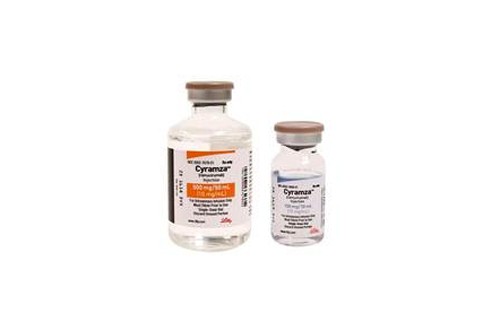
Eli Lilly has chalked up another approval for its new cancer drug Cyramza after the EMA approved it as a second-line therapy for patients with stomach cancer.
The EU approval comes shortly after Cyramza (ramucirumab) was approved as a treatment for non-small cell lung cancer (NSCLC) in the US, where it has been approved for stomach cancer since April.
The EMA has cleared Cyramza for the treatment of adult patients with advanced gastric cancer or gastro-oesophageal junction (GOJ) adenocarcinoma whose disease has progressed despite prior platinum and fluoropyrimidine chemotherapy. It can be used both as a monotherapy and in combination with paclitaxel, as appropriate.
The injectable therapy – a VEGFR2 antagonist that works by blocking the blood supply that fuels tumour growth – is the first drug to be approved in Europe for this indication. It is due to be filed in both NSCLC and colorectal cancer in the EU next year.
In trials, Cyramza was shown to improve overall survival and delayed disease progression in stomach cancer and GOJ patients compared to chemotherapy alone.
“Unfortunately, most patients with gastric cancer face a poor prognosis, said Prof David Ferry, global senior medical director at Lilly, who noted that around 80% of cases are first diagnosed once their cancer has spread and become difficult to treat.
“Despite research efforts, there have been few advances in the last 30 years and inoperable gastric cancer remains a devastating disease [so] ramucirumab provides a welcome new treatment option for these patients,” he added.
Analysts at Deutsche Bank have said that they expect annual sales of Cyramza to reach $2bn by 2020, which would more than justify the $6.5bn price tag for Lilly’s takeover of the drug’s developer ImClone in 2008.
Deutsche Bank see Cyramza as a key component of an “under-the-radar” oncology franchise at Lilly, which also includes Erbitux (cetuximab) successor necitumumab for NSCLC and CDK 4/6 inhibitor abemaciclib for NSCLC and metastatic breast cancer.
The company has also been steadily signing new licensing deals to boost its oncology presence, particularly in the emerging immune-oncology field where it has been somewhat conspicuous by its absence.
In the last few months Lilly has forged alliances with Canada’s ZymeWorks and UK company Immunocore to boost its presence in immunotherapies for cancer.




